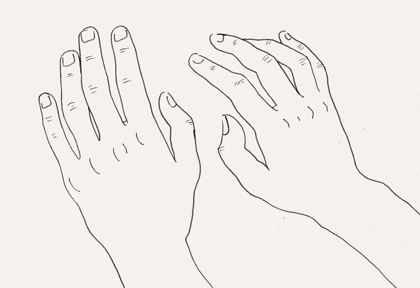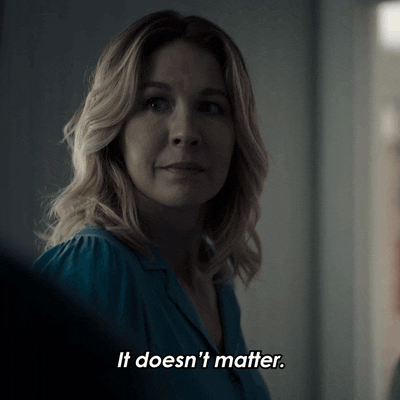'Flights' by Olga Tokarczuk
'Today I can ask myself this question: What have I been looking for?'—Review #155
There’s been more good news for Books on GIF since the newsletter last appeared in your inboxes. I was privileged to be featured in a Q&A with Elizabeth from the fantastic book newsletter What To Read If. If you aren’t already subscribed to it, do yourself a favor and sign up. I always find an interesting book recommendation in each edition. To Elizabeth, Donna and I say:

And to all our new subscribers, we say:

Some of you who have been here a while may remember that I loved Nobel laureate Olga Tokarczuk’s ‘Drive Your Plow Over the Bones of the Dead.’ Donna did, and gave me the Man Booker International prize-winning novel ‘Flights’ as a recent Christmas gift.
Here’s the cover:
If you enjoy this review, click the ♥️ above or
New here?
I was surprised at how different this book is from the one I read previously. ‘Drive Your Plow’ has a straightforward narrative about a woman living in a remote village and a mystery around murders possibly committed by revenge-seeking animals. ‘Flights,’ however, is more fractured and philosophical. It loosely follows a woman who’s often backpacking, but the focus is not on her. Instead, the narrative unfolds through vignettes, story fragments and snippets of insights that I understood to be collected by the woman during her journeys. Several stories feature characters trying to preserve the human body after death or dismemberment. In one, a character who lived centuries ago keeps his amputated lower leg in a jar of chemicals while also becoming a famed anatomical artist who illustrates the inner workings of the body, like:
Those weird and disturbing ‘Bodies’ exhibits that were big a few years back also appear several times. Other stories feature escapes. In one, a ferryman tired of hauling cars and people back and forth between an island and the mainland takes his boat, and everyone on it, out to sea. In another, a wife and child go missing on a small island for three days. When they resurface, the husband is anxious to know where they’ve been and how they evaded the search parties. The wife replies that sometimes people disappear and:
The collected stories in Tokarczuk’s novel add up to an exploration of the malaise of existence and our anxiety about being remembered after we die. To outrun our dread of death, the book suggests we must keep moving, traveling from place to place like the protagonist does. But the destinations themselves aren’t the goal, it’s the people we meet, the stories we hear and the experiences we have along the way that give life its meaning. If I had read this book back in the before times, I might have just shrugged at this conclusion like:
But after a year of living in a pandemic that has restricted our ability to move, it’s clear that Tokarczuk was onto something profound. How much of our anxiety, depression and loneliness will be alleviated once we can be outside, and travel, again? Hopefully we will find out soon!

I admire Tokarczuk’s experimentation with a non-linear format. But the style might not work for all readers. Honestly, I struggled with it, and I thought the story dragged in places. But I’m glad I read ‘Flights,’ and I think it will become a literary touchstone for our lost year. If you’re into innovative storytelling, or using books to process this pandemic, you should read this novel.
How it begins:
HERE I AM
I’m a few years old. I’m sitting on the windowsill, surrounded by strewn toys and toppled-over block towers and dolls with bulging eyes. It’s dark in the house, and the air in the rooms slowly cools, dims. There’s no one else here; they’ve left, they’re gone, though you can still hear their voices dying down, that shuffling, the echoes of their footsteps, some distant laughter. Out the window the courtyard is empty. Darkness spreads softly from the sky, settling on everything like black dew.
The worst part is the stillness, visible, dense—a chilly dusk and the sodium-vapor lamps’ frail light already mired in darkness just a few feet from its source.
Nothing happens—the march of darkness halts at the door to the house, and all the clamor of fading falls silent, makes a thick skin like on hot milk cooling. The contours of the buildings against the backdrop of the sky stretch out into infinity, slowly lose their sharp angles, corners, edges. The dimming light takes the air with it—there’s nothing left to breathe. Now the dark soaks into my skin. Sounds have curled up inside themselves, withdrawn their snail’s eyes; the orchestra of the world has departed, vanishing into the park.
My rating:
‘Flights’ (Bieguni) by Olga Tokarczuk was originally published by Wydawnictwo Literackie, Kraków in 2007. It was translated from the Polish by Jennifer Croft and published by Fitzcarraldo Editions in 2017. The Riverhead Books edition was published in 2018. 403 pages. $15.64 at Bookshop.org.
Disagree with my review? Let me know:
Connect: Twitter | Instagram | Goodreads | Email
Before you go:
ICYMI: Review #154 featured ‘Beneath the Underdog: His World as Composed by Mingus’ by Charles Mingus. | Browse the Archive
Read this: Sheila Heti writes in The Yale Review, ‘A Common Seagull: On making art and mourning.’ In it, she searches the paintings of Pierre Bonnard for insights into art, creativity and grief. If Tokarczuk’s book makes the case for vitality and movement, Heti’s piece counters with introspection and staying put.
Read this, too: I recently subscribed to writer/professor Lincoln Michel’s newsletter called ‘Counter Craft’ where he writes ‘about fiction craft, publishing stuff, weird books, and other literary sundries.’ I always find interesting tidbits about writing or books in Michel’s newsletter. Here’s the latest edition, on ‘The Value of Boring Sentences.’
Thanks for reading, and thanks especially to Donna for editing this newsletter!
Until next time,
MPV












